In-depth Analysis of Agency Relationship and Authority in Business Law
VerifiedAdded on 2023/04/22
|10
|3000
|239
Essay
AI Summary
This essay provides an in-depth analysis of the agency relationship within the context of business law, focusing on the authority conferred upon an agent. It explores the different types of authority, including actual (express and implied), apparent, usual, and authority by necessity. The essay discusses the significance of consent in establishing an agency relationship and the implications of an agent acting within or exceeding their authority. Furthermore, it examines the concept of ratification, where a principal can retroactively approve an agent's actions that were initially beyond their scope of authority. The essay also touches upon vicarious liability, where a principal may be held responsible for an agent's misconduct, even if it falls outside the explicitly granted authority. The arguments are supported by relevant case laws such as Hely-Hutchinson v Brayhead Ltd, Ireland v Livingstone, and Watteau v Fenwick, providing a comprehensive understanding of the legal principles governing agency relationships and authority.
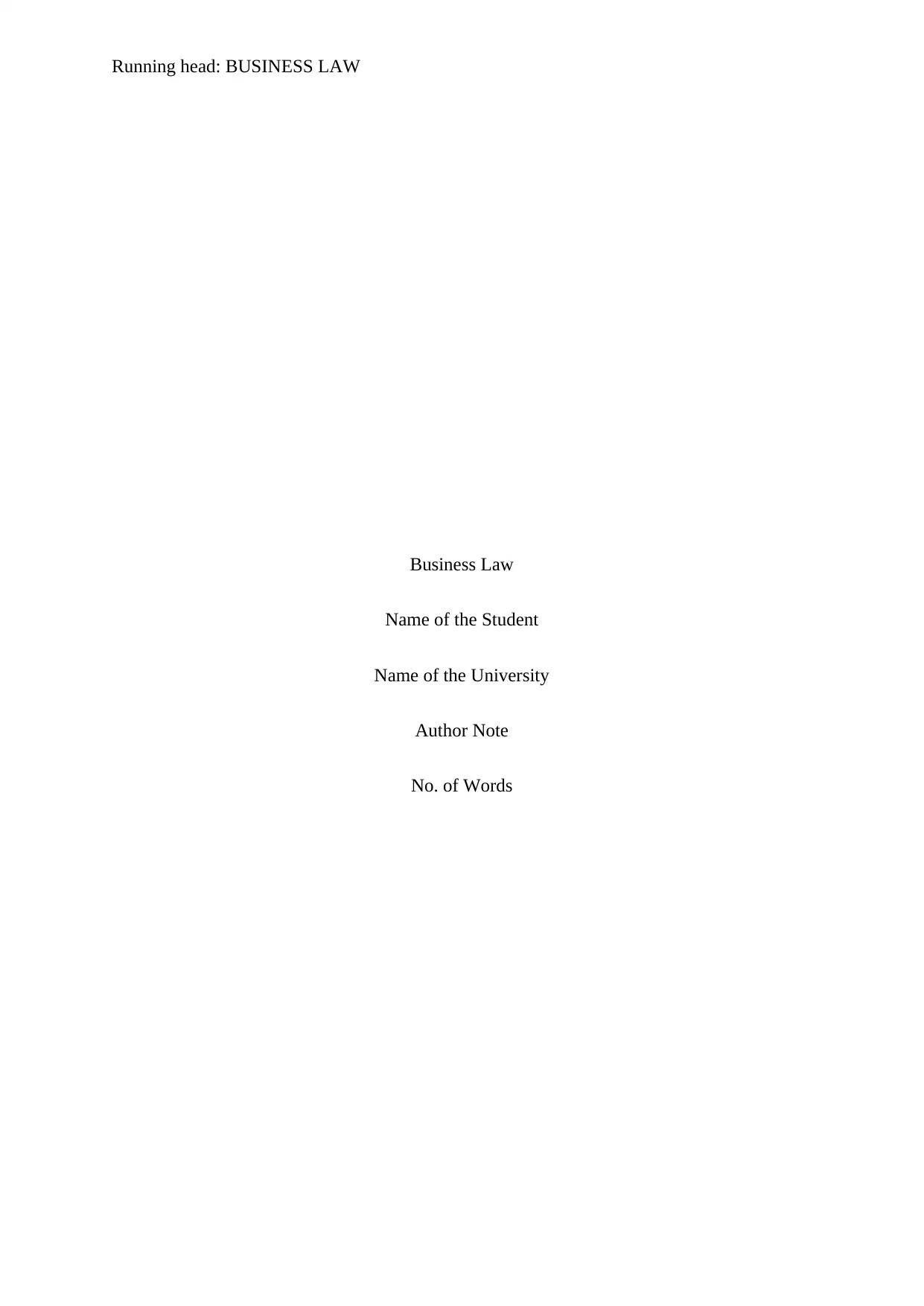
Running head: BUSINESS LAW
Business Law
Name of the Student
Name of the University
Author Note
No. of Words
Business Law
Name of the Student
Name of the University
Author Note
No. of Words
Paraphrase This Document
Need a fresh take? Get an instant paraphrase of this document with our AI Paraphraser
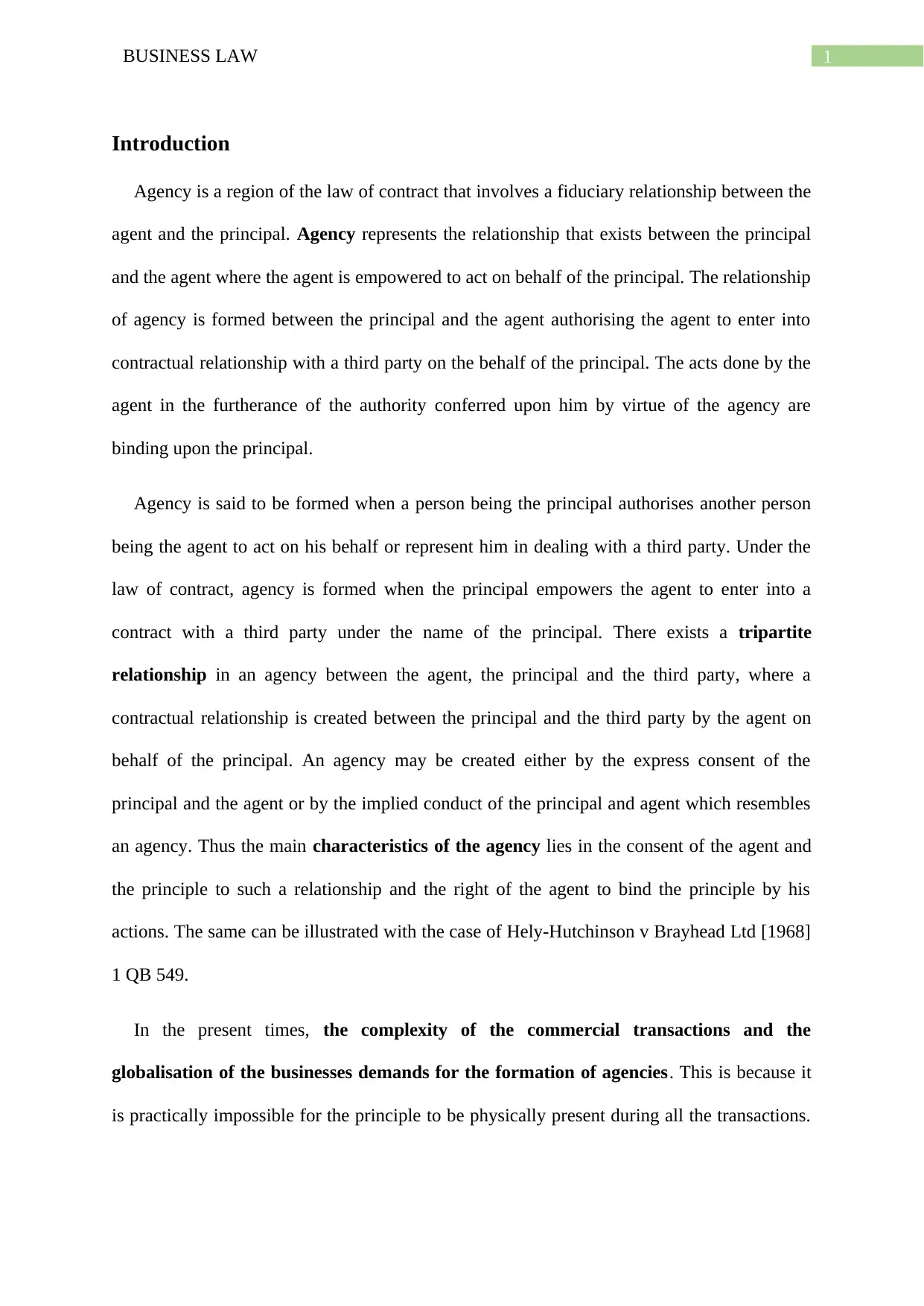
1BUSINESS LAW
Introduction
Agency is a region of the law of contract that involves a fiduciary relationship between the
agent and the principal. Agency represents the relationship that exists between the principal
and the agent where the agent is empowered to act on behalf of the principal. The relationship
of agency is formed between the principal and the agent authorising the agent to enter into
contractual relationship with a third party on the behalf of the principal. The acts done by the
agent in the furtherance of the authority conferred upon him by virtue of the agency are
binding upon the principal.
Agency is said to be formed when a person being the principal authorises another person
being the agent to act on his behalf or represent him in dealing with a third party. Under the
law of contract, agency is formed when the principal empowers the agent to enter into a
contract with a third party under the name of the principal. There exists a tripartite
relationship in an agency between the agent, the principal and the third party, where a
contractual relationship is created between the principal and the third party by the agent on
behalf of the principal. An agency may be created either by the express consent of the
principal and the agent or by the implied conduct of the principal and agent which resembles
an agency. Thus the main characteristics of the agency lies in the consent of the agent and
the principle to such a relationship and the right of the agent to bind the principle by his
actions. The same can be illustrated with the case of Hely-Hutchinson v Brayhead Ltd [1968]
1 QB 549.
In the present times, the complexity of the commercial transactions and the
globalisation of the businesses demands for the formation of agencies. This is because it
is practically impossible for the principle to be physically present during all the transactions.
Introduction
Agency is a region of the law of contract that involves a fiduciary relationship between the
agent and the principal. Agency represents the relationship that exists between the principal
and the agent where the agent is empowered to act on behalf of the principal. The relationship
of agency is formed between the principal and the agent authorising the agent to enter into
contractual relationship with a third party on the behalf of the principal. The acts done by the
agent in the furtherance of the authority conferred upon him by virtue of the agency are
binding upon the principal.
Agency is said to be formed when a person being the principal authorises another person
being the agent to act on his behalf or represent him in dealing with a third party. Under the
law of contract, agency is formed when the principal empowers the agent to enter into a
contract with a third party under the name of the principal. There exists a tripartite
relationship in an agency between the agent, the principal and the third party, where a
contractual relationship is created between the principal and the third party by the agent on
behalf of the principal. An agency may be created either by the express consent of the
principal and the agent or by the implied conduct of the principal and agent which resembles
an agency. Thus the main characteristics of the agency lies in the consent of the agent and
the principle to such a relationship and the right of the agent to bind the principle by his
actions. The same can be illustrated with the case of Hely-Hutchinson v Brayhead Ltd [1968]
1 QB 549.
In the present times, the complexity of the commercial transactions and the
globalisation of the businesses demands for the formation of agencies. This is because it
is practically impossible for the principle to be physically present during all the transactions.
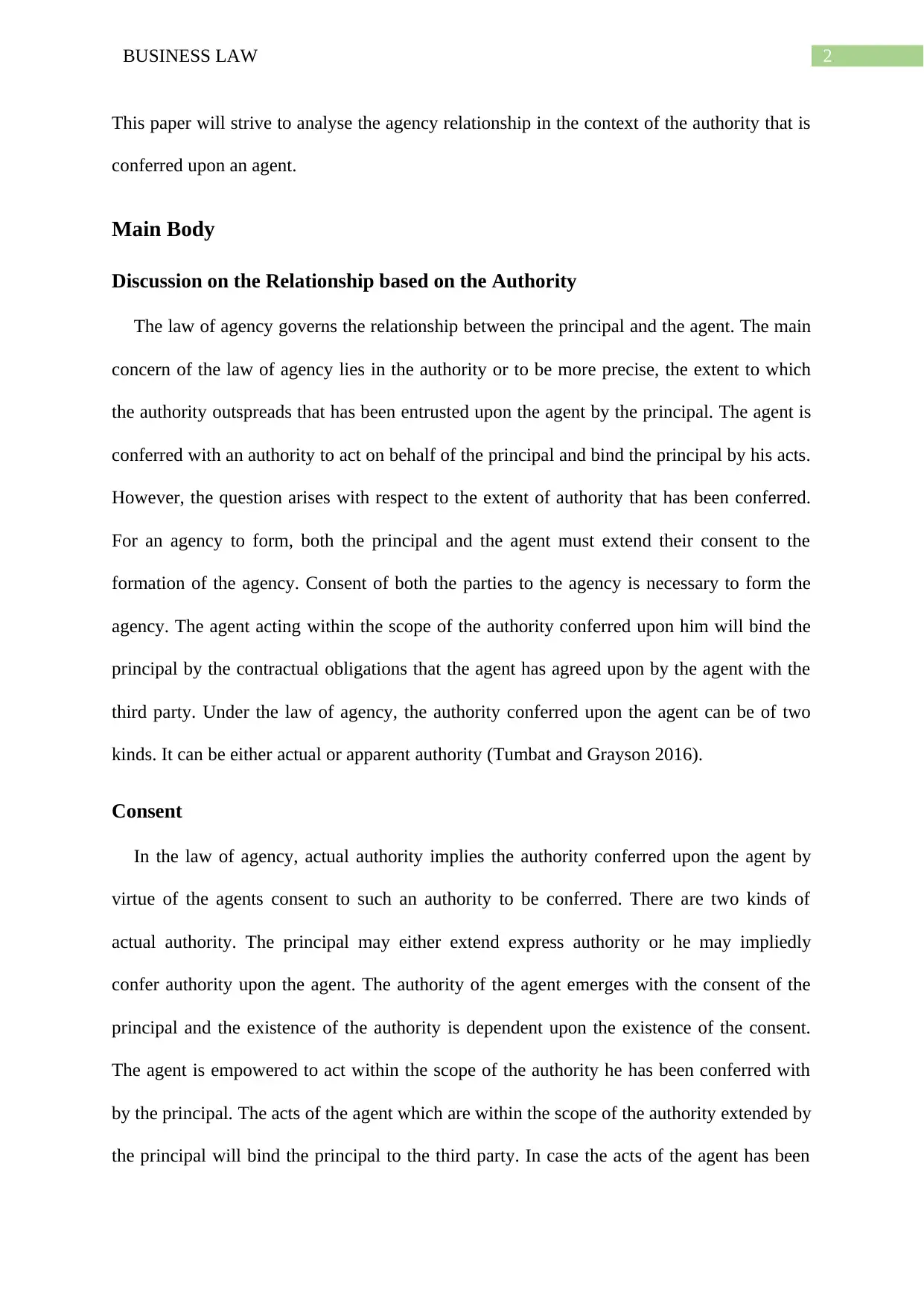
2BUSINESS LAW
This paper will strive to analyse the agency relationship in the context of the authority that is
conferred upon an agent.
Main Body
Discussion on the Relationship based on the Authority
The law of agency governs the relationship between the principal and the agent. The main
concern of the law of agency lies in the authority or to be more precise, the extent to which
the authority outspreads that has been entrusted upon the agent by the principal. The agent is
conferred with an authority to act on behalf of the principal and bind the principal by his acts.
However, the question arises with respect to the extent of authority that has been conferred.
For an agency to form, both the principal and the agent must extend their consent to the
formation of the agency. Consent of both the parties to the agency is necessary to form the
agency. The agent acting within the scope of the authority conferred upon him will bind the
principal by the contractual obligations that the agent has agreed upon by the agent with the
third party. Under the law of agency, the authority conferred upon the agent can be of two
kinds. It can be either actual or apparent authority (Tumbat and Grayson 2016).
Consent
In the law of agency, actual authority implies the authority conferred upon the agent by
virtue of the agents consent to such an authority to be conferred. There are two kinds of
actual authority. The principal may either extend express authority or he may impliedly
confer authority upon the agent. The authority of the agent emerges with the consent of the
principal and the existence of the authority is dependent upon the existence of the consent.
The agent is empowered to act within the scope of the authority he has been conferred with
by the principal. The acts of the agent which are within the scope of the authority extended by
the principal will bind the principal to the third party. In case the acts of the agent has been
This paper will strive to analyse the agency relationship in the context of the authority that is
conferred upon an agent.
Main Body
Discussion on the Relationship based on the Authority
The law of agency governs the relationship between the principal and the agent. The main
concern of the law of agency lies in the authority or to be more precise, the extent to which
the authority outspreads that has been entrusted upon the agent by the principal. The agent is
conferred with an authority to act on behalf of the principal and bind the principal by his acts.
However, the question arises with respect to the extent of authority that has been conferred.
For an agency to form, both the principal and the agent must extend their consent to the
formation of the agency. Consent of both the parties to the agency is necessary to form the
agency. The agent acting within the scope of the authority conferred upon him will bind the
principal by the contractual obligations that the agent has agreed upon by the agent with the
third party. Under the law of agency, the authority conferred upon the agent can be of two
kinds. It can be either actual or apparent authority (Tumbat and Grayson 2016).
Consent
In the law of agency, actual authority implies the authority conferred upon the agent by
virtue of the agents consent to such an authority to be conferred. There are two kinds of
actual authority. The principal may either extend express authority or he may impliedly
confer authority upon the agent. The authority of the agent emerges with the consent of the
principal and the existence of the authority is dependent upon the existence of the consent.
The agent is empowered to act within the scope of the authority he has been conferred with
by the principal. The acts of the agent which are within the scope of the authority extended by
the principal will bind the principal to the third party. In case the acts of the agent has been
⊘ This is a preview!⊘
Do you want full access?
Subscribe today to unlock all pages.

Trusted by 1+ million students worldwide
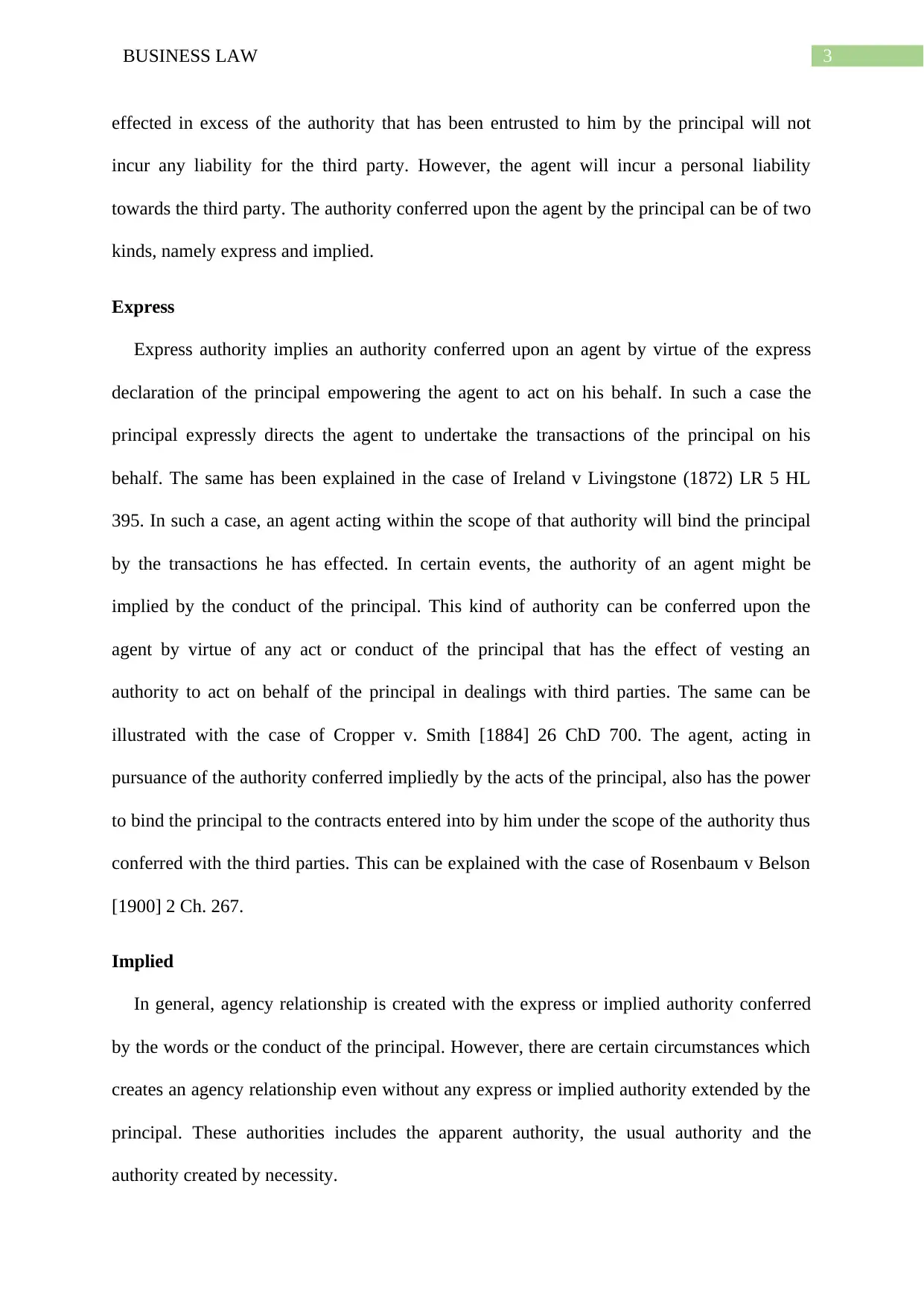
3BUSINESS LAW
effected in excess of the authority that has been entrusted to him by the principal will not
incur any liability for the third party. However, the agent will incur a personal liability
towards the third party. The authority conferred upon the agent by the principal can be of two
kinds, namely express and implied.
Express
Express authority implies an authority conferred upon an agent by virtue of the express
declaration of the principal empowering the agent to act on his behalf. In such a case the
principal expressly directs the agent to undertake the transactions of the principal on his
behalf. The same has been explained in the case of Ireland v Livingstone (1872) LR 5 HL
395. In such a case, an agent acting within the scope of that authority will bind the principal
by the transactions he has effected. In certain events, the authority of an agent might be
implied by the conduct of the principal. This kind of authority can be conferred upon the
agent by virtue of any act or conduct of the principal that has the effect of vesting an
authority to act on behalf of the principal in dealings with third parties. The same can be
illustrated with the case of Cropper v. Smith [1884] 26 ChD 700. The agent, acting in
pursuance of the authority conferred impliedly by the acts of the principal, also has the power
to bind the principal to the contracts entered into by him under the scope of the authority thus
conferred with the third parties. This can be explained with the case of Rosenbaum v Belson
[1900] 2 Ch. 267.
Implied
In general, agency relationship is created with the express or implied authority conferred
by the words or the conduct of the principal. However, there are certain circumstances which
creates an agency relationship even without any express or implied authority extended by the
principal. These authorities includes the apparent authority, the usual authority and the
authority created by necessity.
effected in excess of the authority that has been entrusted to him by the principal will not
incur any liability for the third party. However, the agent will incur a personal liability
towards the third party. The authority conferred upon the agent by the principal can be of two
kinds, namely express and implied.
Express
Express authority implies an authority conferred upon an agent by virtue of the express
declaration of the principal empowering the agent to act on his behalf. In such a case the
principal expressly directs the agent to undertake the transactions of the principal on his
behalf. The same has been explained in the case of Ireland v Livingstone (1872) LR 5 HL
395. In such a case, an agent acting within the scope of that authority will bind the principal
by the transactions he has effected. In certain events, the authority of an agent might be
implied by the conduct of the principal. This kind of authority can be conferred upon the
agent by virtue of any act or conduct of the principal that has the effect of vesting an
authority to act on behalf of the principal in dealings with third parties. The same can be
illustrated with the case of Cropper v. Smith [1884] 26 ChD 700. The agent, acting in
pursuance of the authority conferred impliedly by the acts of the principal, also has the power
to bind the principal to the contracts entered into by him under the scope of the authority thus
conferred with the third parties. This can be explained with the case of Rosenbaum v Belson
[1900] 2 Ch. 267.
Implied
In general, agency relationship is created with the express or implied authority conferred
by the words or the conduct of the principal. However, there are certain circumstances which
creates an agency relationship even without any express or implied authority extended by the
principal. These authorities includes the apparent authority, the usual authority and the
authority created by necessity.
Paraphrase This Document
Need a fresh take? Get an instant paraphrase of this document with our AI Paraphraser
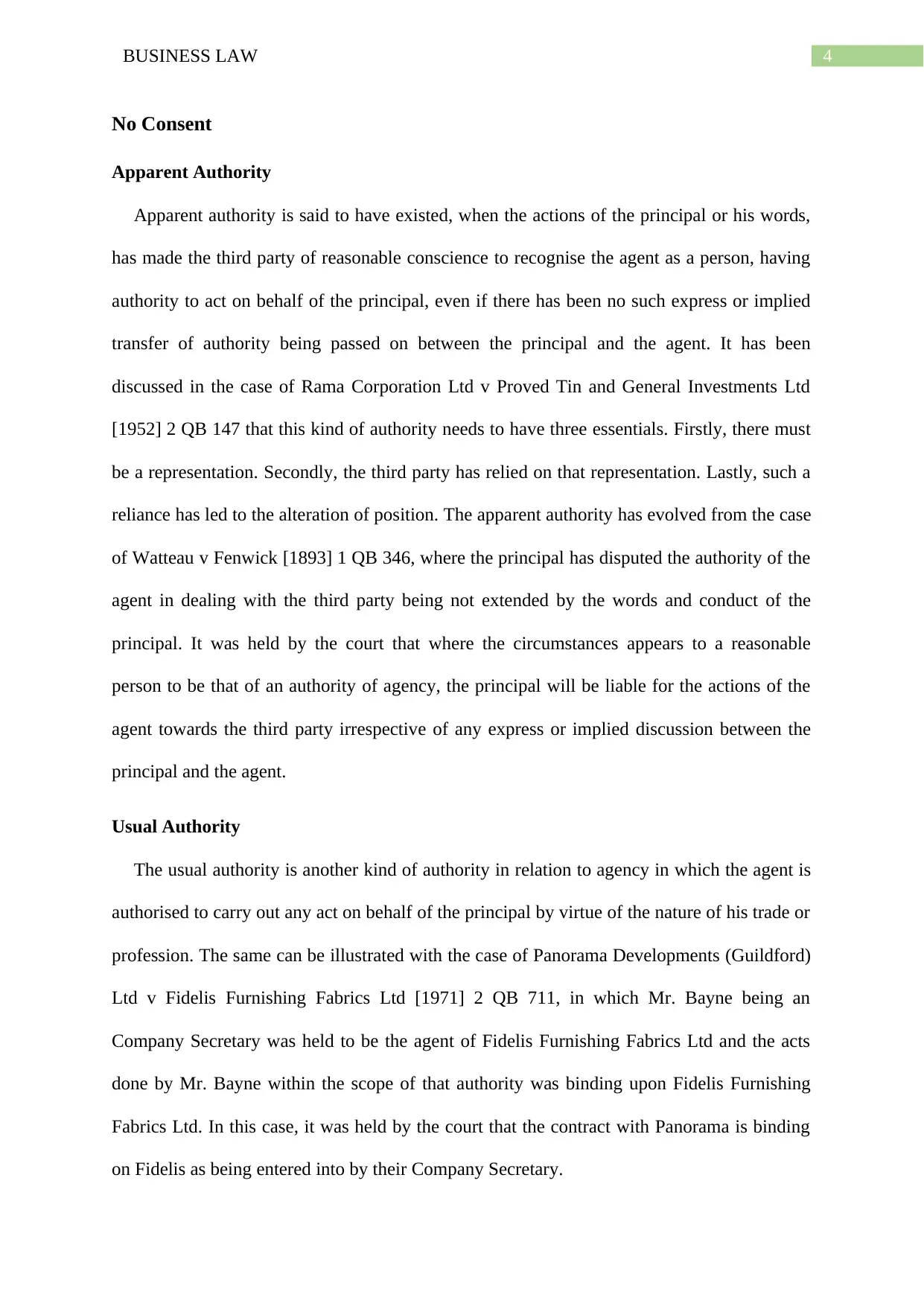
4BUSINESS LAW
No Consent
Apparent Authority
Apparent authority is said to have existed, when the actions of the principal or his words,
has made the third party of reasonable conscience to recognise the agent as a person, having
authority to act on behalf of the principal, even if there has been no such express or implied
transfer of authority being passed on between the principal and the agent. It has been
discussed in the case of Rama Corporation Ltd v Proved Tin and General Investments Ltd
[1952] 2 QB 147 that this kind of authority needs to have three essentials. Firstly, there must
be a representation. Secondly, the third party has relied on that representation. Lastly, such a
reliance has led to the alteration of position. The apparent authority has evolved from the case
of Watteau v Fenwick [1893] 1 QB 346, where the principal has disputed the authority of the
agent in dealing with the third party being not extended by the words and conduct of the
principal. It was held by the court that where the circumstances appears to a reasonable
person to be that of an authority of agency, the principal will be liable for the actions of the
agent towards the third party irrespective of any express or implied discussion between the
principal and the agent.
Usual Authority
The usual authority is another kind of authority in relation to agency in which the agent is
authorised to carry out any act on behalf of the principal by virtue of the nature of his trade or
profession. The same can be illustrated with the case of Panorama Developments (Guildford)
Ltd v Fidelis Furnishing Fabrics Ltd [1971] 2 QB 711, in which Mr. Bayne being an
Company Secretary was held to be the agent of Fidelis Furnishing Fabrics Ltd and the acts
done by Mr. Bayne within the scope of that authority was binding upon Fidelis Furnishing
Fabrics Ltd. In this case, it was held by the court that the contract with Panorama is binding
on Fidelis as being entered into by their Company Secretary.
No Consent
Apparent Authority
Apparent authority is said to have existed, when the actions of the principal or his words,
has made the third party of reasonable conscience to recognise the agent as a person, having
authority to act on behalf of the principal, even if there has been no such express or implied
transfer of authority being passed on between the principal and the agent. It has been
discussed in the case of Rama Corporation Ltd v Proved Tin and General Investments Ltd
[1952] 2 QB 147 that this kind of authority needs to have three essentials. Firstly, there must
be a representation. Secondly, the third party has relied on that representation. Lastly, such a
reliance has led to the alteration of position. The apparent authority has evolved from the case
of Watteau v Fenwick [1893] 1 QB 346, where the principal has disputed the authority of the
agent in dealing with the third party being not extended by the words and conduct of the
principal. It was held by the court that where the circumstances appears to a reasonable
person to be that of an authority of agency, the principal will be liable for the actions of the
agent towards the third party irrespective of any express or implied discussion between the
principal and the agent.
Usual Authority
The usual authority is another kind of authority in relation to agency in which the agent is
authorised to carry out any act on behalf of the principal by virtue of the nature of his trade or
profession. The same can be illustrated with the case of Panorama Developments (Guildford)
Ltd v Fidelis Furnishing Fabrics Ltd [1971] 2 QB 711, in which Mr. Bayne being an
Company Secretary was held to be the agent of Fidelis Furnishing Fabrics Ltd and the acts
done by Mr. Bayne within the scope of that authority was binding upon Fidelis Furnishing
Fabrics Ltd. In this case, it was held by the court that the contract with Panorama is binding
on Fidelis as being entered into by their Company Secretary.
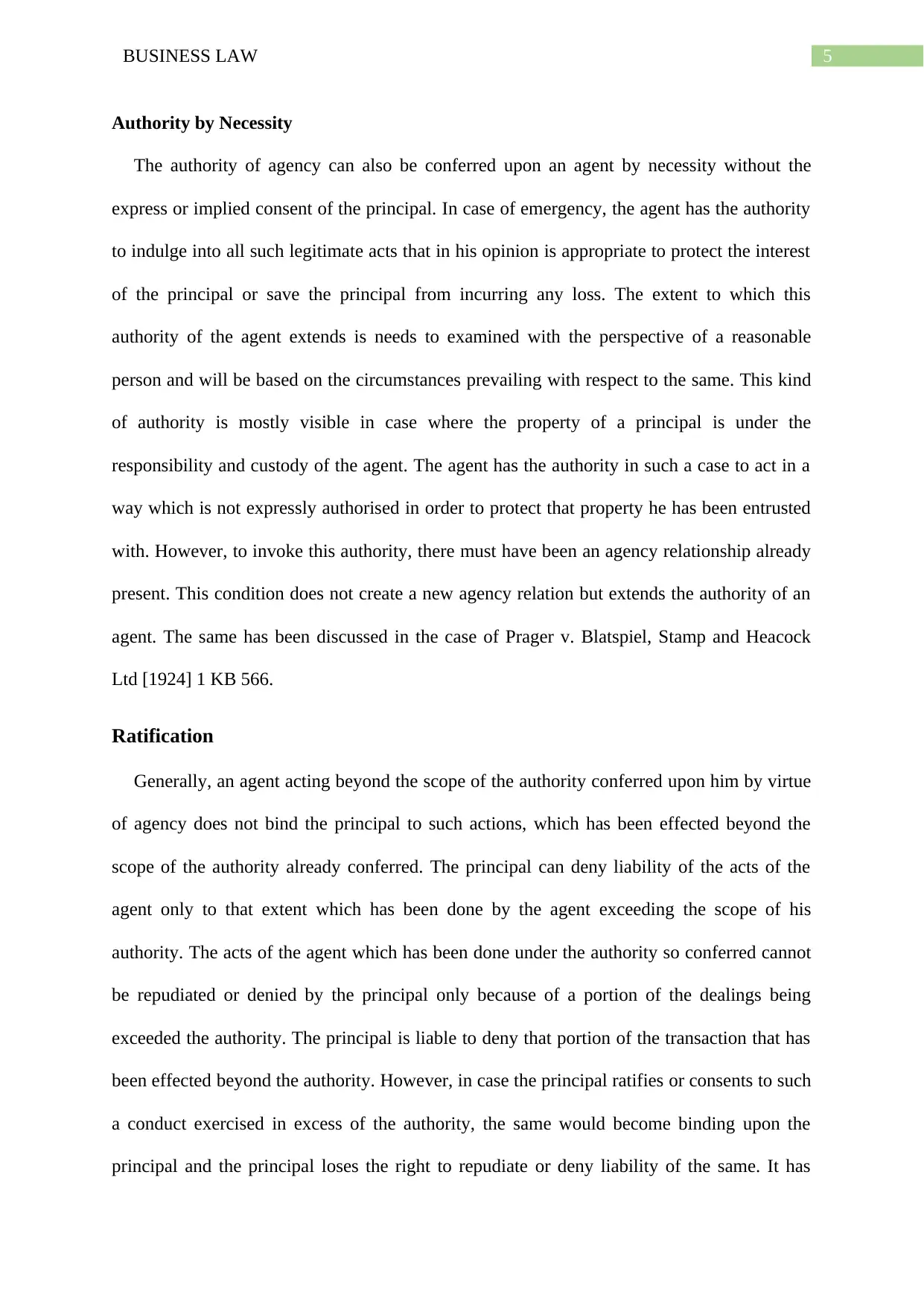
5BUSINESS LAW
Authority by Necessity
The authority of agency can also be conferred upon an agent by necessity without the
express or implied consent of the principal. In case of emergency, the agent has the authority
to indulge into all such legitimate acts that in his opinion is appropriate to protect the interest
of the principal or save the principal from incurring any loss. The extent to which this
authority of the agent extends is needs to examined with the perspective of a reasonable
person and will be based on the circumstances prevailing with respect to the same. This kind
of authority is mostly visible in case where the property of a principal is under the
responsibility and custody of the agent. The agent has the authority in such a case to act in a
way which is not expressly authorised in order to protect that property he has been entrusted
with. However, to invoke this authority, there must have been an agency relationship already
present. This condition does not create a new agency relation but extends the authority of an
agent. The same has been discussed in the case of Prager v. Blatspiel, Stamp and Heacock
Ltd [1924] 1 KB 566.
Ratification
Generally, an agent acting beyond the scope of the authority conferred upon him by virtue
of agency does not bind the principal to such actions, which has been effected beyond the
scope of the authority already conferred. The principal can deny liability of the acts of the
agent only to that extent which has been done by the agent exceeding the scope of his
authority. The acts of the agent which has been done under the authority so conferred cannot
be repudiated or denied by the principal only because of a portion of the dealings being
exceeded the authority. The principal is liable to deny that portion of the transaction that has
been effected beyond the authority. However, in case the principal ratifies or consents to such
a conduct exercised in excess of the authority, the same would become binding upon the
principal and the principal loses the right to repudiate or deny liability of the same. It has
Authority by Necessity
The authority of agency can also be conferred upon an agent by necessity without the
express or implied consent of the principal. In case of emergency, the agent has the authority
to indulge into all such legitimate acts that in his opinion is appropriate to protect the interest
of the principal or save the principal from incurring any loss. The extent to which this
authority of the agent extends is needs to examined with the perspective of a reasonable
person and will be based on the circumstances prevailing with respect to the same. This kind
of authority is mostly visible in case where the property of a principal is under the
responsibility and custody of the agent. The agent has the authority in such a case to act in a
way which is not expressly authorised in order to protect that property he has been entrusted
with. However, to invoke this authority, there must have been an agency relationship already
present. This condition does not create a new agency relation but extends the authority of an
agent. The same has been discussed in the case of Prager v. Blatspiel, Stamp and Heacock
Ltd [1924] 1 KB 566.
Ratification
Generally, an agent acting beyond the scope of the authority conferred upon him by virtue
of agency does not bind the principal to such actions, which has been effected beyond the
scope of the authority already conferred. The principal can deny liability of the acts of the
agent only to that extent which has been done by the agent exceeding the scope of his
authority. The acts of the agent which has been done under the authority so conferred cannot
be repudiated or denied by the principal only because of a portion of the dealings being
exceeded the authority. The principal is liable to deny that portion of the transaction that has
been effected beyond the authority. However, in case the principal ratifies or consents to such
a conduct exercised in excess of the authority, the same would become binding upon the
principal and the principal loses the right to repudiate or deny liability of the same. It has
⊘ This is a preview!⊘
Do you want full access?
Subscribe today to unlock all pages.

Trusted by 1+ million students worldwide
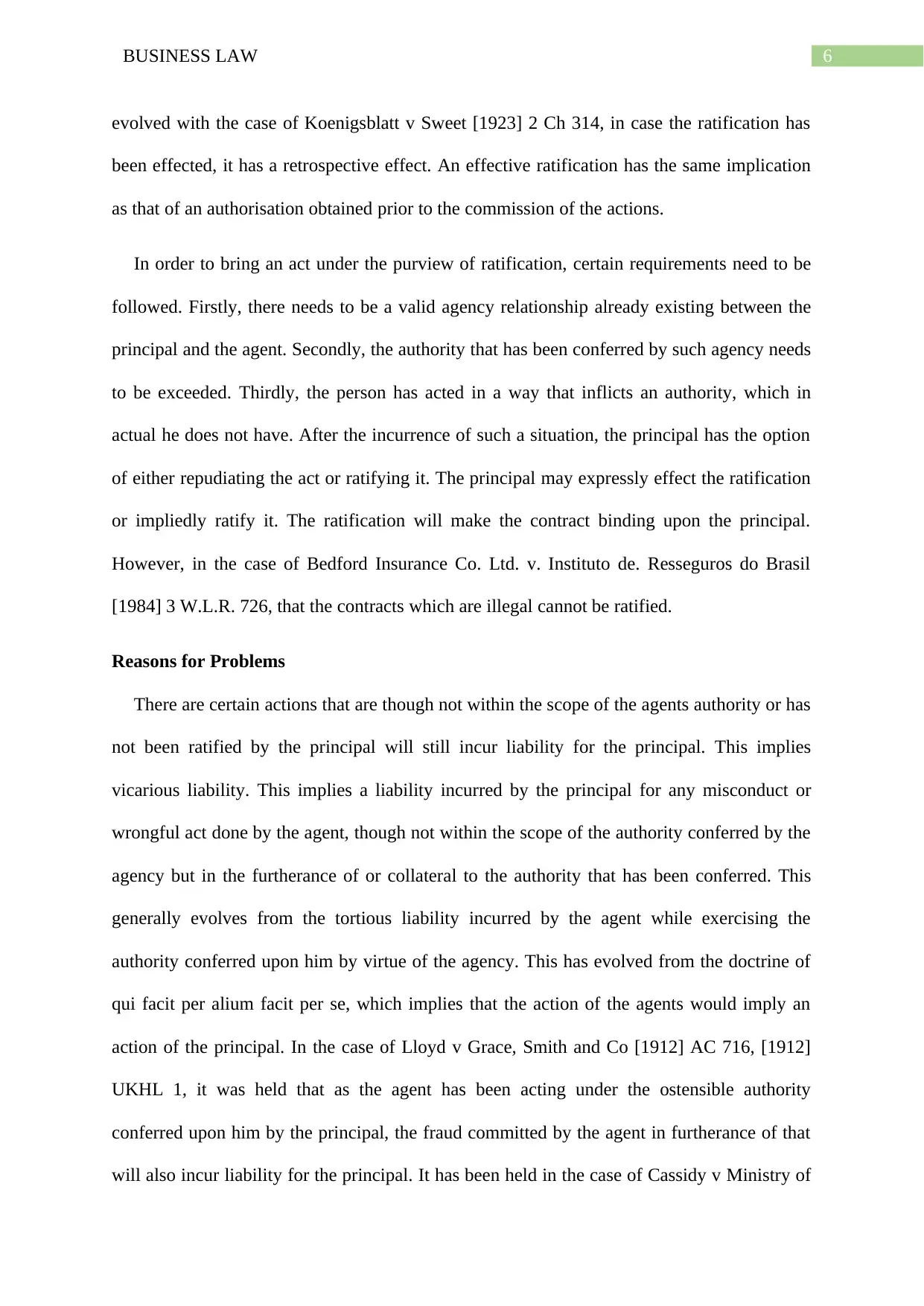
6BUSINESS LAW
evolved with the case of Koenigsblatt v Sweet [1923] 2 Ch 314, in case the ratification has
been effected, it has a retrospective effect. An effective ratification has the same implication
as that of an authorisation obtained prior to the commission of the actions.
In order to bring an act under the purview of ratification, certain requirements need to be
followed. Firstly, there needs to be a valid agency relationship already existing between the
principal and the agent. Secondly, the authority that has been conferred by such agency needs
to be exceeded. Thirdly, the person has acted in a way that inflicts an authority, which in
actual he does not have. After the incurrence of such a situation, the principal has the option
of either repudiating the act or ratifying it. The principal may expressly effect the ratification
or impliedly ratify it. The ratification will make the contract binding upon the principal.
However, in the case of Bedford Insurance Co. Ltd. v. Instituto de. Resseguros do Brasil
[1984] 3 W.L.R. 726, that the contracts which are illegal cannot be ratified.
Reasons for Problems
There are certain actions that are though not within the scope of the agents authority or has
not been ratified by the principal will still incur liability for the principal. This implies
vicarious liability. This implies a liability incurred by the principal for any misconduct or
wrongful act done by the agent, though not within the scope of the authority conferred by the
agency but in the furtherance of or collateral to the authority that has been conferred. This
generally evolves from the tortious liability incurred by the agent while exercising the
authority conferred upon him by virtue of the agency. This has evolved from the doctrine of
qui facit per alium facit per se, which implies that the action of the agents would imply an
action of the principal. In the case of Lloyd v Grace, Smith and Co [1912] AC 716, [1912]
UKHL 1, it was held that as the agent has been acting under the ostensible authority
conferred upon him by the principal, the fraud committed by the agent in furtherance of that
will also incur liability for the principal. It has been held in the case of Cassidy v Ministry of
evolved with the case of Koenigsblatt v Sweet [1923] 2 Ch 314, in case the ratification has
been effected, it has a retrospective effect. An effective ratification has the same implication
as that of an authorisation obtained prior to the commission of the actions.
In order to bring an act under the purview of ratification, certain requirements need to be
followed. Firstly, there needs to be a valid agency relationship already existing between the
principal and the agent. Secondly, the authority that has been conferred by such agency needs
to be exceeded. Thirdly, the person has acted in a way that inflicts an authority, which in
actual he does not have. After the incurrence of such a situation, the principal has the option
of either repudiating the act or ratifying it. The principal may expressly effect the ratification
or impliedly ratify it. The ratification will make the contract binding upon the principal.
However, in the case of Bedford Insurance Co. Ltd. v. Instituto de. Resseguros do Brasil
[1984] 3 W.L.R. 726, that the contracts which are illegal cannot be ratified.
Reasons for Problems
There are certain actions that are though not within the scope of the agents authority or has
not been ratified by the principal will still incur liability for the principal. This implies
vicarious liability. This implies a liability incurred by the principal for any misconduct or
wrongful act done by the agent, though not within the scope of the authority conferred by the
agency but in the furtherance of or collateral to the authority that has been conferred. This
generally evolves from the tortious liability incurred by the agent while exercising the
authority conferred upon him by virtue of the agency. This has evolved from the doctrine of
qui facit per alium facit per se, which implies that the action of the agents would imply an
action of the principal. In the case of Lloyd v Grace, Smith and Co [1912] AC 716, [1912]
UKHL 1, it was held that as the agent has been acting under the ostensible authority
conferred upon him by the principal, the fraud committed by the agent in furtherance of that
will also incur liability for the principal. It has been held in the case of Cassidy v Ministry of
Paraphrase This Document
Need a fresh take? Get an instant paraphrase of this document with our AI Paraphraser
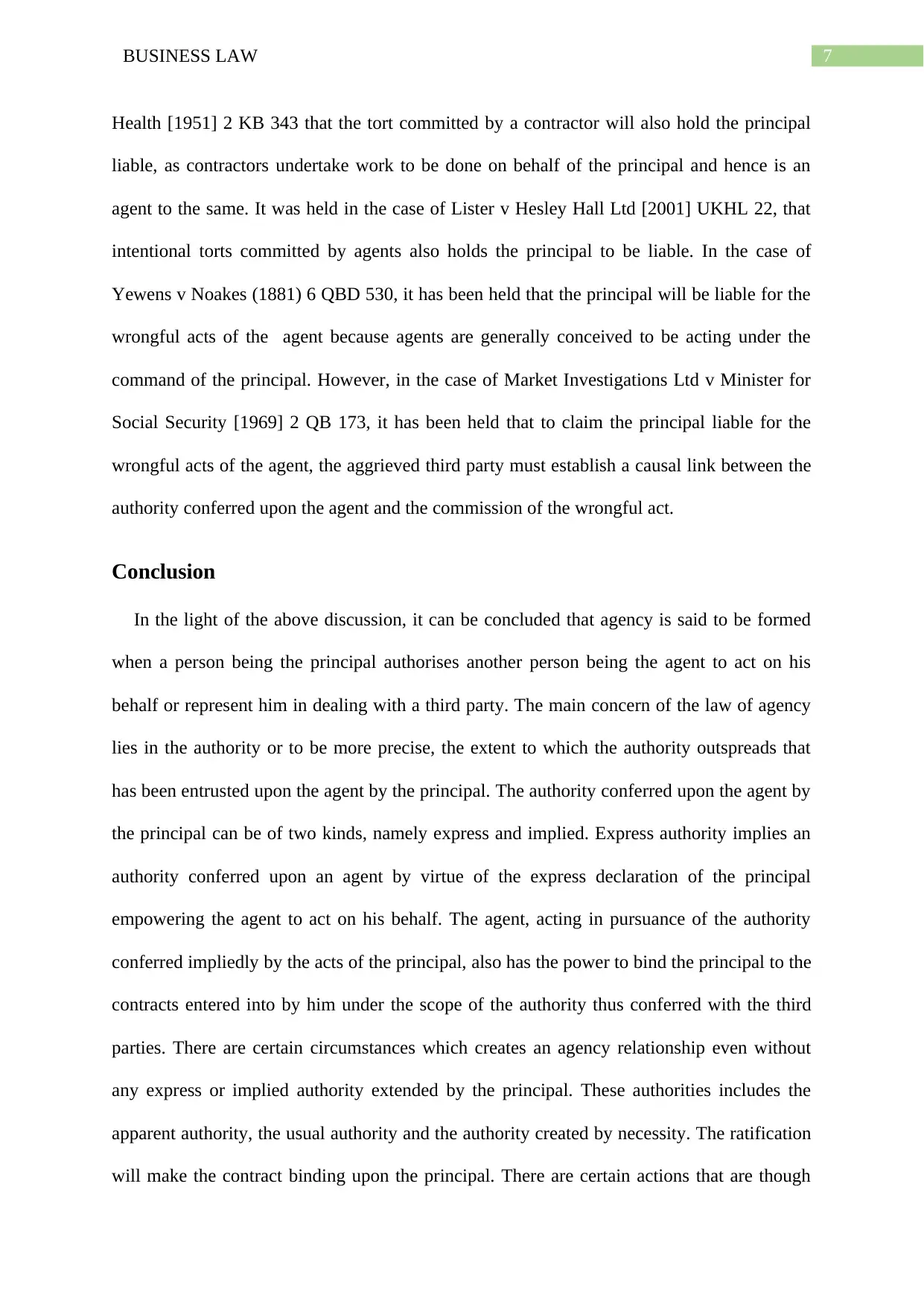
7BUSINESS LAW
Health [1951] 2 KB 343 that the tort committed by a contractor will also hold the principal
liable, as contractors undertake work to be done on behalf of the principal and hence is an
agent to the same. It was held in the case of Lister v Hesley Hall Ltd [2001] UKHL 22, that
intentional torts committed by agents also holds the principal to be liable. In the case of
Yewens v Noakes (1881) 6 QBD 530, it has been held that the principal will be liable for the
wrongful acts of the agent because agents are generally conceived to be acting under the
command of the principal. However, in the case of Market Investigations Ltd v Minister for
Social Security [1969] 2 QB 173, it has been held that to claim the principal liable for the
wrongful acts of the agent, the aggrieved third party must establish a causal link between the
authority conferred upon the agent and the commission of the wrongful act.
Conclusion
In the light of the above discussion, it can be concluded that agency is said to be formed
when a person being the principal authorises another person being the agent to act on his
behalf or represent him in dealing with a third party. The main concern of the law of agency
lies in the authority or to be more precise, the extent to which the authority outspreads that
has been entrusted upon the agent by the principal. The authority conferred upon the agent by
the principal can be of two kinds, namely express and implied. Express authority implies an
authority conferred upon an agent by virtue of the express declaration of the principal
empowering the agent to act on his behalf. The agent, acting in pursuance of the authority
conferred impliedly by the acts of the principal, also has the power to bind the principal to the
contracts entered into by him under the scope of the authority thus conferred with the third
parties. There are certain circumstances which creates an agency relationship even without
any express or implied authority extended by the principal. These authorities includes the
apparent authority, the usual authority and the authority created by necessity. The ratification
will make the contract binding upon the principal. There are certain actions that are though
Health [1951] 2 KB 343 that the tort committed by a contractor will also hold the principal
liable, as contractors undertake work to be done on behalf of the principal and hence is an
agent to the same. It was held in the case of Lister v Hesley Hall Ltd [2001] UKHL 22, that
intentional torts committed by agents also holds the principal to be liable. In the case of
Yewens v Noakes (1881) 6 QBD 530, it has been held that the principal will be liable for the
wrongful acts of the agent because agents are generally conceived to be acting under the
command of the principal. However, in the case of Market Investigations Ltd v Minister for
Social Security [1969] 2 QB 173, it has been held that to claim the principal liable for the
wrongful acts of the agent, the aggrieved third party must establish a causal link between the
authority conferred upon the agent and the commission of the wrongful act.
Conclusion
In the light of the above discussion, it can be concluded that agency is said to be formed
when a person being the principal authorises another person being the agent to act on his
behalf or represent him in dealing with a third party. The main concern of the law of agency
lies in the authority or to be more precise, the extent to which the authority outspreads that
has been entrusted upon the agent by the principal. The authority conferred upon the agent by
the principal can be of two kinds, namely express and implied. Express authority implies an
authority conferred upon an agent by virtue of the express declaration of the principal
empowering the agent to act on his behalf. The agent, acting in pursuance of the authority
conferred impliedly by the acts of the principal, also has the power to bind the principal to the
contracts entered into by him under the scope of the authority thus conferred with the third
parties. There are certain circumstances which creates an agency relationship even without
any express or implied authority extended by the principal. These authorities includes the
apparent authority, the usual authority and the authority created by necessity. The ratification
will make the contract binding upon the principal. There are certain actions that are though
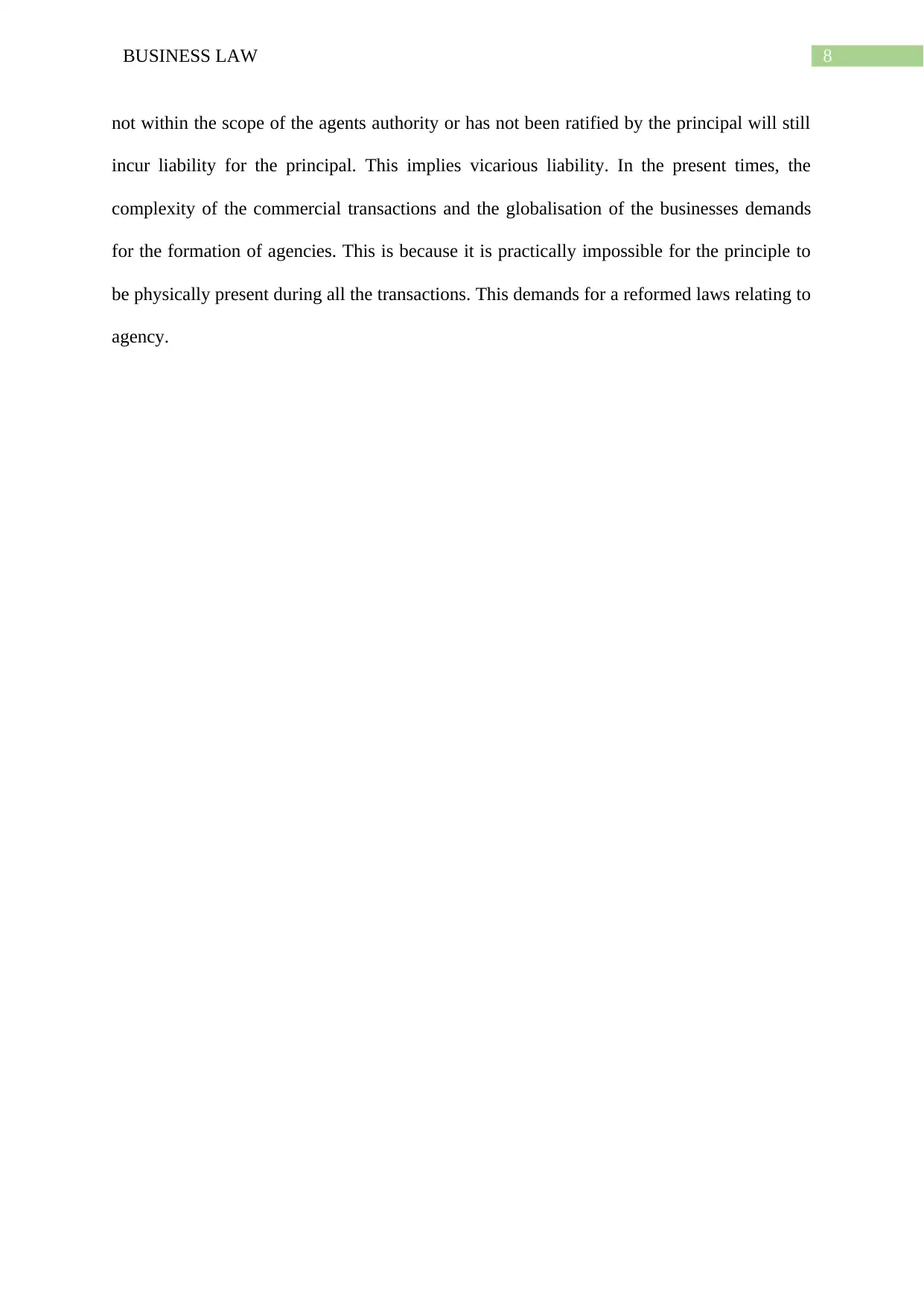
8BUSINESS LAW
not within the scope of the agents authority or has not been ratified by the principal will still
incur liability for the principal. This implies vicarious liability. In the present times, the
complexity of the commercial transactions and the globalisation of the businesses demands
for the formation of agencies. This is because it is practically impossible for the principle to
be physically present during all the transactions. This demands for a reformed laws relating to
agency.
not within the scope of the agents authority or has not been ratified by the principal will still
incur liability for the principal. This implies vicarious liability. In the present times, the
complexity of the commercial transactions and the globalisation of the businesses demands
for the formation of agencies. This is because it is practically impossible for the principle to
be physically present during all the transactions. This demands for a reformed laws relating to
agency.
⊘ This is a preview!⊘
Do you want full access?
Subscribe today to unlock all pages.

Trusted by 1+ million students worldwide
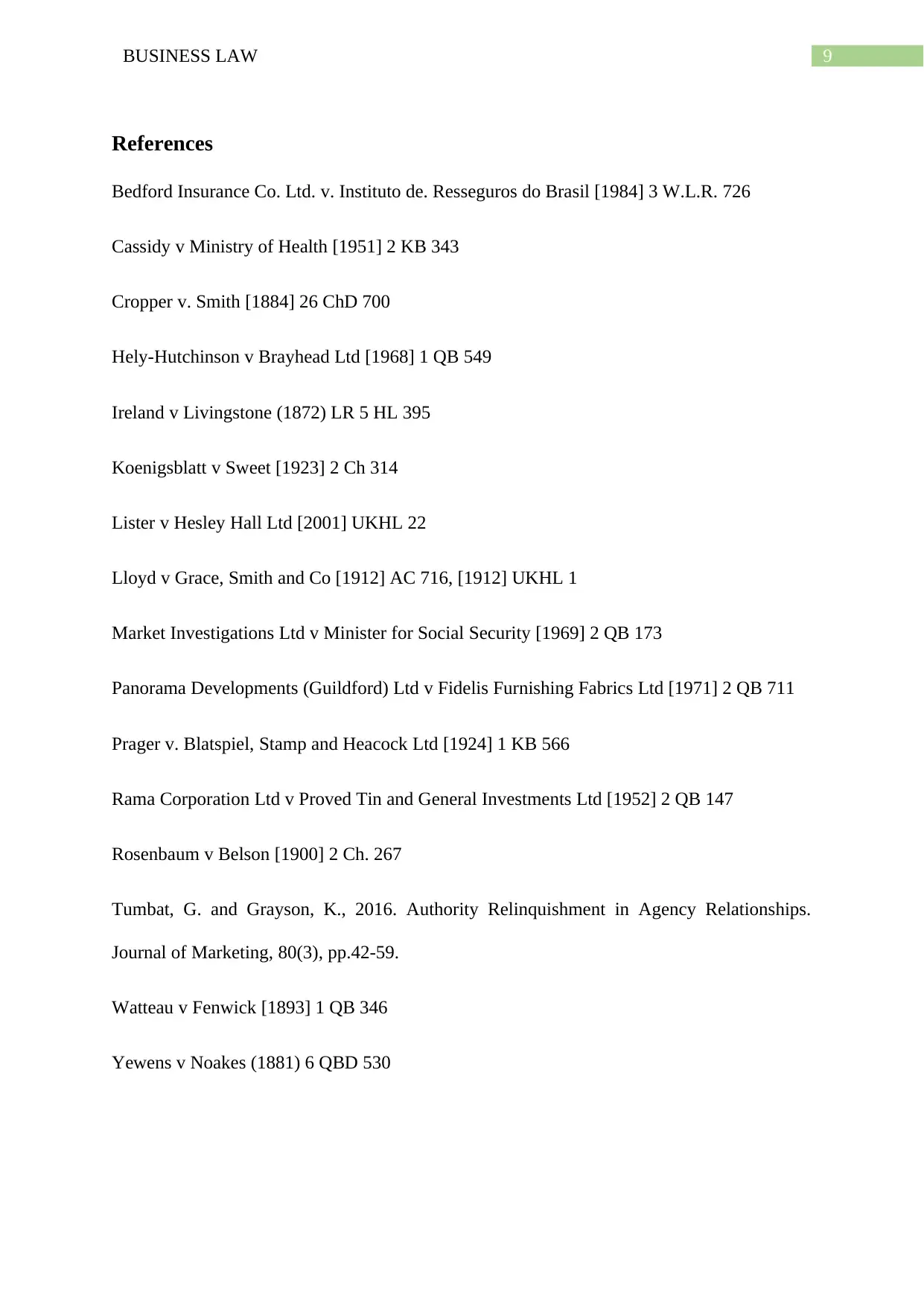
9BUSINESS LAW
References
Bedford Insurance Co. Ltd. v. Instituto de. Resseguros do Brasil [1984] 3 W.L.R. 726
Cassidy v Ministry of Health [1951] 2 KB 343
Cropper v. Smith [1884] 26 ChD 700
Hely-Hutchinson v Brayhead Ltd [1968] 1 QB 549
Ireland v Livingstone (1872) LR 5 HL 395
Koenigsblatt v Sweet [1923] 2 Ch 314
Lister v Hesley Hall Ltd [2001] UKHL 22
Lloyd v Grace, Smith and Co [1912] AC 716, [1912] UKHL 1
Market Investigations Ltd v Minister for Social Security [1969] 2 QB 173
Panorama Developments (Guildford) Ltd v Fidelis Furnishing Fabrics Ltd [1971] 2 QB 711
Prager v. Blatspiel, Stamp and Heacock Ltd [1924] 1 KB 566
Rama Corporation Ltd v Proved Tin and General Investments Ltd [1952] 2 QB 147
Rosenbaum v Belson [1900] 2 Ch. 267
Tumbat, G. and Grayson, K., 2016. Authority Relinquishment in Agency Relationships.
Journal of Marketing, 80(3), pp.42-59.
Watteau v Fenwick [1893] 1 QB 346
Yewens v Noakes (1881) 6 QBD 530
References
Bedford Insurance Co. Ltd. v. Instituto de. Resseguros do Brasil [1984] 3 W.L.R. 726
Cassidy v Ministry of Health [1951] 2 KB 343
Cropper v. Smith [1884] 26 ChD 700
Hely-Hutchinson v Brayhead Ltd [1968] 1 QB 549
Ireland v Livingstone (1872) LR 5 HL 395
Koenigsblatt v Sweet [1923] 2 Ch 314
Lister v Hesley Hall Ltd [2001] UKHL 22
Lloyd v Grace, Smith and Co [1912] AC 716, [1912] UKHL 1
Market Investigations Ltd v Minister for Social Security [1969] 2 QB 173
Panorama Developments (Guildford) Ltd v Fidelis Furnishing Fabrics Ltd [1971] 2 QB 711
Prager v. Blatspiel, Stamp and Heacock Ltd [1924] 1 KB 566
Rama Corporation Ltd v Proved Tin and General Investments Ltd [1952] 2 QB 147
Rosenbaum v Belson [1900] 2 Ch. 267
Tumbat, G. and Grayson, K., 2016. Authority Relinquishment in Agency Relationships.
Journal of Marketing, 80(3), pp.42-59.
Watteau v Fenwick [1893] 1 QB 346
Yewens v Noakes (1881) 6 QBD 530
1 out of 10
Related Documents
Your All-in-One AI-Powered Toolkit for Academic Success.
+13062052269
info@desklib.com
Available 24*7 on WhatsApp / Email
![[object Object]](/_next/static/media/star-bottom.7253800d.svg)
Unlock your academic potential
Copyright © 2020–2026 A2Z Services. All Rights Reserved. Developed and managed by ZUCOL.





